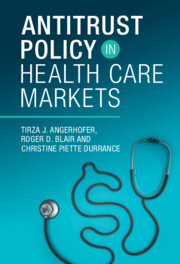Book contents
- Antitrust Policy in Health Care Markets
- Antitrust Policy in Health Care Markets
- Copyright page
- Dedication
- Contents
- Figures
- Tables
- Acknowledgments
- Table of Cases
- 1 Health Care Markets and Competition Policy
- 2 Antitrust Policy in the United States
- Part I Monopoly
- Part II Seller Cartels
- 6 Collusion in Health Care Markets
- 7 Collusion in Generic Drug Markets
- 8 The Hatch-Waxman Act, Patent Infringement Suits, and Reverse Payments
- 9 The Alleged Insulin Conspiracy
- 10 Licensing of Health Care Professionals
- Part III Monopsony
- Part IV Buyer Cartels
- Part V Mergers and Acquisitions
- Index
- References
8 - The Hatch-Waxman Act, Patent Infringement Suits, and Reverse Payments
from Part II - Seller Cartels
Published online by Cambridge University Press: 24 November 2022
- Antitrust Policy in Health Care Markets
- Antitrust Policy in Health Care Markets
- Copyright page
- Dedication
- Contents
- Figures
- Tables
- Acknowledgments
- Table of Cases
- 1 Health Care Markets and Competition Policy
- 2 Antitrust Policy in the United States
- Part I Monopoly
- Part II Seller Cartels
- 6 Collusion in Health Care Markets
- 7 Collusion in Generic Drug Markets
- 8 The Hatch-Waxman Act, Patent Infringement Suits, and Reverse Payments
- 9 The Alleged Insulin Conspiracy
- 10 Licensing of Health Care Professionals
- Part III Monopsony
- Part IV Buyer Cartels
- Part V Mergers and Acquisitions
- Index
- References
Summary
The Hatch-Waxman Act of 1984 extended the patent life of a pioneer drug to compensate for delays in the FDA approval process, which incentivized pioneer firms to invest in research and development and accelerated the entry of generic drugs, which would reduce pharmaceutical expenditures. Unfortunately, the Act has serious flaws that encourage both generic producers and pioneer firms to game the system. In the pursuit of economic profit, some producers of generic drugs use the Hatch-Waxman Act to challenge pioneer brands that were covered by valid patents. This conduct undermines the value of the patent awarded to the pioneer firm by the Patent and Trademark Office. At the same time, pioneer firms stall generic competition by filing perhaps baseless patent infringement suits. After 30 months, the pioneer firm and the would-be entrant often strike deals that result in reverse payments by the pioneer firm to the generic producer to delay its entry into the market. This conduct has aroused antitrust concerns that are the subject of this chapter.
- Type
- Chapter
- Information
- Antitrust Policy in Health Care Markets , pp. 168 - 203Publisher: Cambridge University PressPrint publication year: 2022

